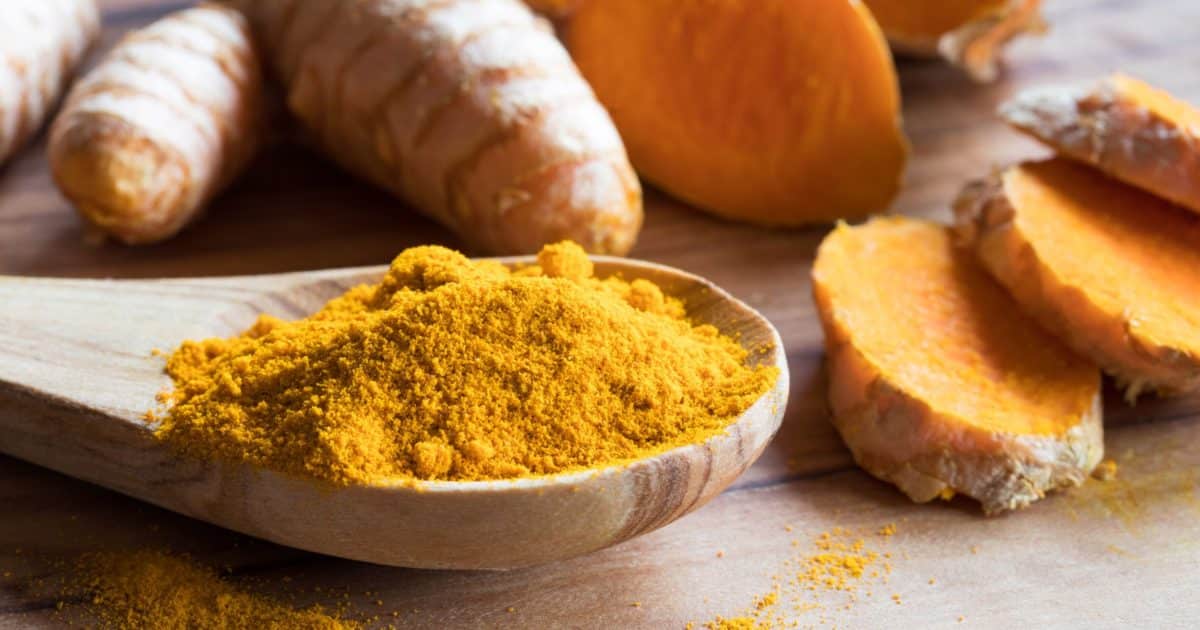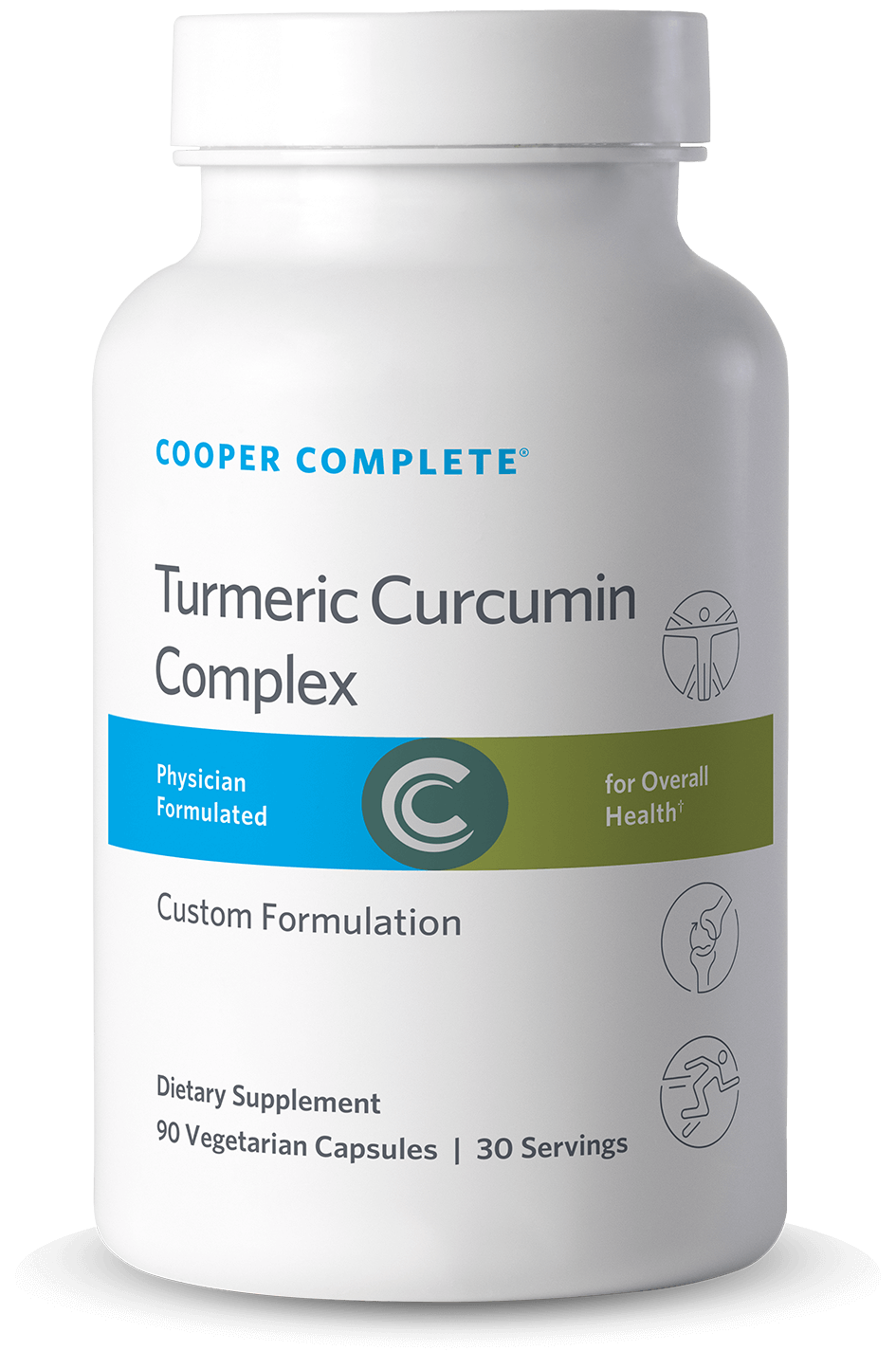Eight Turmeric Supplement Benefits—More than Just Inflammation Support

Turmeric is a spice commonly found in curries of all kinds and has been used for thousands of years in India and other cultures as a natural remedy. Turmeric comes from the root of the curcuma longa plant and contains curcumin; a natural anti-inflammatory said to have considerable health benefits.
Inflammation is a common symptom of many infectious diseases. However, an increasing body of evidence shows chronic inflammation can cause and advance many common diseases including, cancer and autoimmune disorders. Turmeric and curcumin work together to fight inflammation in the body. Cooper Clinic Platinum (Concierge Medicine) Physician Riva Rahl, MD, explores turmeric curcumin’s key benefits of joint and skin health as well as helping reduce free radicals. “Most people who take turmeric are now taking it for the curcumin, for its antioxidant and anti-inflammatory properties,” says Dr. Rahl. Does taking turmeric provide additional health benefits beyond these three?

Turmeric Curcumin Supplement
Contains 1000 mg of turmeric extract, which is standardized to contain 95% curcuminoids, and 10 mg of black pepper in 3 vegetarian capsules. Physician formulated to support a healthy inflammatory response.
$35.98 Add to cartTurmeric Supplement Benefit #1: Helps Lower Inflammation
Curcumin from the turmeric plant is an antioxidant that fights free radicals (unstable molecules) in the body that can damage cells. Scavenging free radicals in the body reduces the levels of stress the body experiences. A natural anti-inflammatory, curcumin’s key trait is how it helps prevent the body’s inflammation response before it begins. Turmeric inhibits the release of chemicals in the body that trigger the inflammation process.
“Turmeric works to suppress the protein complex NF-κB, which causes inflammation at a molecular level and is attributed to many chronic diseases such as heart disease and cancer,” explains Dr. Rahl. “Beyond suppressing NF-κB, turmeric has also been shown to reduce inflammation associated with rheumatoid arthritis and osteoarthritis.”
Joint health and pain reduction
Turmeric studies often focus on curcumin and how it benefits joint health. Many studies have noticed decreases in chronic inflammation throughout the body as a result of taking curcumin. By controlling inflammation levels, curcumin helps reduce pain in the body and joints.
Excessive inflammation in the joints is the leading cause of arthritis pain. Reports show curcumin can be effective at slowing the amount of joint inflammation. Two smaller studies found curcumin to reduce joint swelling and stiffness associated with rheumatoid arthritis.
Turmeric’s anti-inflammatory properties make the powerful spice an ideal daily supplement for many people. “I personally take Cooper Complete Turmeric Curcumin Complex Supplement,” says Dr. Rahl. “I like to run a lot which tends to make my joints inflamed. I have found turmeric to really help with that.”
Turmeric is best absorbed with a fatty meal. Piperine, a compound found in black pepper, also enhances turmeric absorption by 2000%. Regular black pepper is 2-7% piperine, so it is estimated that ¼ teaspoon of ground black pepper is the equivalent of 10 to 35 mg of piperine. Piperine has also been shown to improve the absorption of coenzyme Q10 and iron. Cooper Complete Turmeric Curcumin Complex supplement is a formulation of 1000 mg curcumin (standardized to 95% total curcuminoids) and 10 mg BioPerine® (a patented black pepper extract that is 95% piperine).
Turmeric Supplement Benefit #2: Helps Improve Skin Health
Skin is another part of the body that can become damaged due to increased inflammation. In fact, many common skin conditions such as rashes or itching are typically a direct result of skin inflammation.
Using curcumin to control skin health has been the focus of recent studies. For example, one study used curcumin to improve health after UV ray exposure, and another concerned with curcumin and healthy bacteria found positive results.
Turmeric Supplement Benefit #3: May Improve Heart Health
Turmeric is said to improve blood vessel function in addition to positively counteracting inflammation and oxidation. For a healthy heart, cholesterol levels must be kept at safe levels to ensure optimal blood flow. Excessive blood lipids, such as cholesterol, lead to fat deposits building on artery walls and increasing blood pressure. As a result, a higher risk of heart disease is directly related to these conditions.
In a study published in the Nutrition Journal, scientists tested the ability of turmeric to control blood lipid levels. Results indicate curcumin was able to reduce blood lipid levels for patients considered at risk for heart disease. The patients in the study taking turmeric curcumin supplements experienced “a natural cardioprotective effect” in controlling LDL and triglyceride levels.
Turmeric Supplement Benefit #4: May Aid In Digestion
In addition to the benefits already mentioned, some smaller studies have suggested turmeric may be helpful for digestion. Low stomach acid and bile levels can cause poor digestion. Bacterial infections can result from poor digestion and a lack of stomach fluid to digest food properly.
Turmeric helps by improving the stomach’s response to create the necessary chemicals. Adequate stomach chemicals allow food to break down better and move more efficiently through the body. In addition, turmeric can help prevent ulcers from forming in the stomach resulting from stress or alcohol.
A small study of 116 adults found turmeric better than a placebo for indigestion. The participants taking turmeric took 2000 mg per day (500 mg, four times daily).
It is best to take this dietary supplement with a snack or meal that includes fat, which aids turmeric digestion and absorption.

Turmeric Curcumin Supplement
Contains 1000 mg of turmeric extract, which is standardized to contain 95% curcuminoids, and 10 mg of black pepper in 3 vegetarian capsules. Physician formulated to support a healthy inflammatory response.
$35.98 Add to cartTurmeric Supplement Benefit #5: May Improve Insulin Resistance and Diabetes
Preliminary research shows individuals with metabolic syndrome or prediabetes who take turmeric long term may have a lower chance of advancing to diabetes. Curcumin may lessen blood sugar and increase insulin in healthy people after eating. A study of 15 healthy young adults (average age 26 years) found turmeric taken before eating reduced the increase in blood sugar by 61% and insulin levels by 26% compared with a placebo. The same researchers also conducted a 90-day study of 29 adults (average age 52) with insulin resistance and found supplementation reduced insulin resistance compared to placebo.
Turmeric Supplement Benefit #6: May Improve Brain Health and Mood Support
Turmeric can increase brain-derived neurotrophic factor (BDNF) levels, which helps form new neurons and therefore could play a role in reducing dementia. It is also shown to boost serotonin and dopamine, which reduces depression.
Several research studies show curcumin—the substance that creates turmeric’s yellow pigment—possesses antidepressant properties. Consuming 1 gram daily of oral curcumin significantly improves symptoms of depression after six weeks and enhances the performance of antidepressants for adults with major depressive disorders. However, it is unclear whether curcumin is beneficial when used for longer than eight weeks.
Turmeric Supplement Benefit #7: May Provide Asthma and Allergy Relief
One in four adults in the U.S. suffers seasonal allergic rhinitis (AR), an allergic reaction to pollen from trees, grasses and weeds. Curcumin—a compound found in Cooper Complete Turmeric Curcumin Complex—may provide relief to AR sufferers by improving nasal airflow and modulating immune response. In addition, studies show curcumin’s anti-inflammatory and antioxidant effects provide clinical benefits to adults with asthma.
Turmeric Supplement Benefit #8: May Support Weight Loss
Compiling and analyzing results from 11 studies, a group of researchers concluded curcumin supplementation delivered significant positive effects on body weight and body mass index (BMI) when administering 1 gram per day over a period of 8 weeks or longer. In addition, curcumin had a significant effect on waist circumference for overweight adults when administered at the same dose and period.
Forms of Turmeric and Amounts of Curcumin
Turmeric is grown in Southeast Asia. Grocery stores in larger cities may have fresh turmeric root in the produce section and turmeric powder in the spice aisle. Only around 3 percent of turmeric’s total weight contains curcumin, and the turmeric extracts found in supplements are much higher, to levels as high as 95% total curcuminoids. (Cooper Complete Turmeric Curcumin Complex supplement contains curcumin extract standardized to 95% total curcuminoids.)
Enormous amounts of turmeric would need to be consumed in food to approach the levels found in supplements. The typical Southeast Asian diet contains adequate amounts of curcumin where supplementation is not necessary; the American diet, on the other hand, does not. While turmeric is found in most curry, adding it into smoothies and juices is also an easy way to incorporate turmeric into your diet.
Turmeric Possible Side Effects and Risks
When taken in recommended dosages, common side effects of taking a turmeric curcumin supplement can include gas, bloating and acid reflux. If taken in large doses, the small amount of oxalate found in turmeric may induce problems for people prone to specific types of kidney stones containing oxalates.
While research continues on the benefits of turmeric, it is always important to consult your physician before adding a supplement to your regimen. Your physician understands your health profile best, so it’s important to talk to them about which supplements are best for you.
